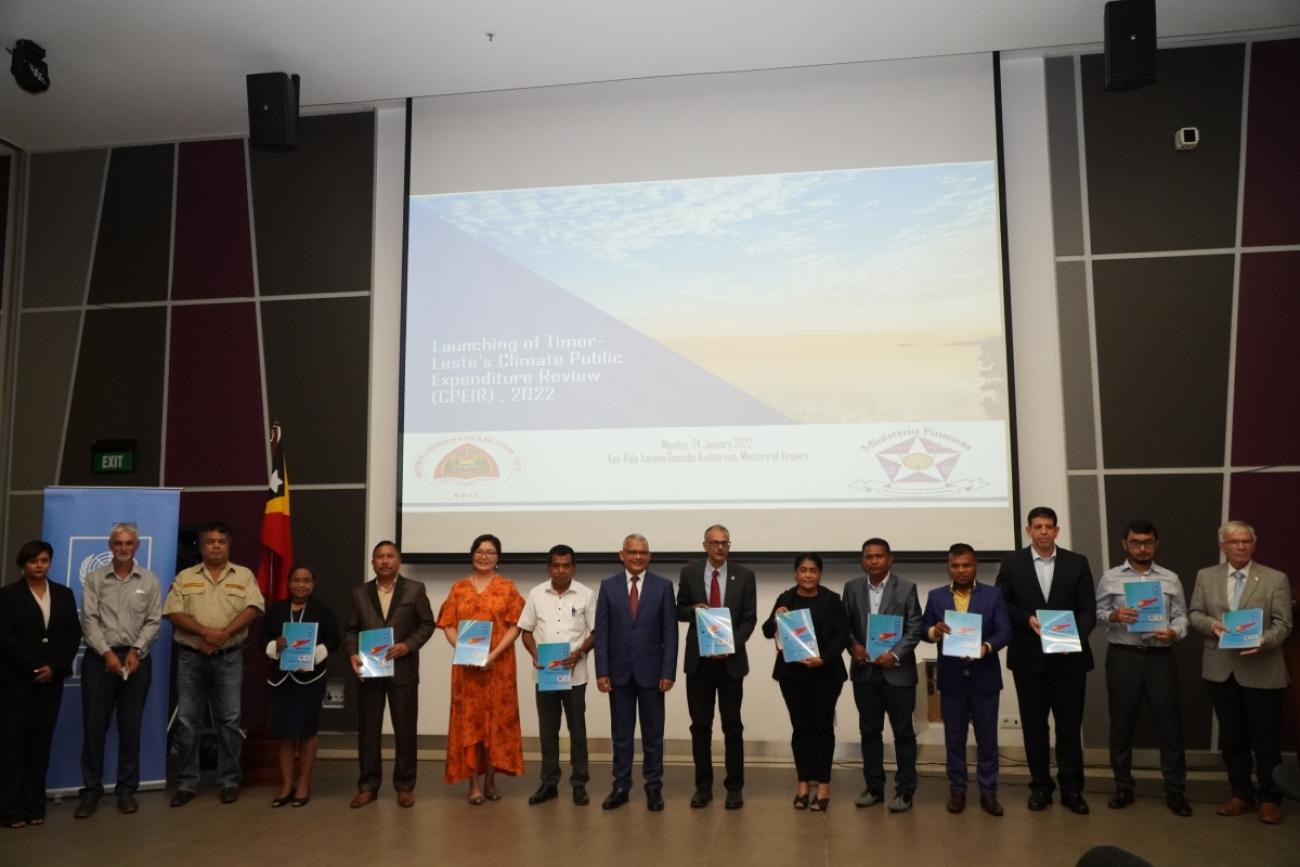Launch Of Timor Leste’s Climate Public Expenditure Review (CPEIR)

Ministry of Finance and UNDP Timor-Leste, has completed the country’s first CPEIR covering the years between 2018-2021.
In collaboration with the Ministry of Finance, UNDP Timor-Leste has completed the country’s first Climate Public Expenditure and Institutional Review (CPEIR), covering the years between 2018-2021. The study thoroughly reviews the climate-relevant policies, institutions, and expenditures supported by the government for each of the sixteen key sectors prioritized for Timor-Leste’s development.
Climate Public Expenditure and Institutional Review is a systematic qualitative and quantitative analysis of a country’s public expenditures and how they relate to climate change. CPEIR is an innovative tool that presents evidence on public expenditures across all budget organizations, government programs and policies.
In his opening Remarks, Minister Rui Gomes said, “We have come to learn through this study that in recent years Timor-Leste’s climate relevant public expenditure has been on a declining trend. This finding makes sense given the political changes and budgetary impasse suffered by the government since 2017. As a new country we need stability and sturdy guidance towards social, infrastructural, and economic development, affording that, however, in recent years has been a challenge. The sufferer has been public at large, especially the farmers, women, and children, who are victims of the impact of climate change. So, what do we do? Do we leave the fate of our people at the whimsy of politicians at the parliament? That can’t be an option; not an acceptable one to the remotest extent. Towards that end we are very appreciative of the study’s recommendation of introducing climate budget tagging within our public financial management system. We are a democracy, and we are fully committed to protect our hard-earned democratic processes and liberties.”
Climate Public Expenditure and Institutional Review is a useful tool for better national planning and budgeting, especially in terms of identifying and tracking budget allocations that respond to climate change challenges. For Timor-Leste, climate finance is a matter of survival to mitigate existing and future losses and damages that potentially threaten lands, infrastructure, and livelihoods. Failure to allocate the critical finance today may transform into the losses and damages of lives and livelihoods tomorrow. UNDP supports Timor-Leste and other countries, particularly SIDS, on the climate emergency, and advocates for additional financial commitments to mitigate the effects of climate change.
Ms. Munkhtuya Altangerel, UNDP Resident Representative stated, ‘’Timor-Leste is one of the most vulnerable countries to climate-induced disasters. Climate change is expected to have a range of significant impacts, including altering rainfall patterns, altering the onset of seasons, sea level rise, and increasing the intensity and the frequency of extreme climate events, these impacts are all expected to have negative impacts on economy and livelihood, such those we experienced last April (Seroja, Easter Flood)…The country requires coordinated efforts to increase efficiency and transparency of the existing resources and to mobilize additional climate-finance from all public and private sources’’.
Current Report, CPIER Timor Leste 2022, has reviewed 16 sectors in Social cluster (health, education, etc.), Infrastructure cluster (roads, WASH, ports), and Economic Development cluster (agriculture, petroleum, tourism, etc). Every government and donor projects/ programs mentioned in budget books over the past 4 years have been studied to find out any climate relevant activities expenditures. Findings reveal that even in the difficult 2021 high climate relevant expenses were 2.31 percent of GDP and medium climate relevant expenses almost 6 percent of GDP.
This event was concluded with an with technical presentation from Climate Public Finance Consultant, Ms. Bushra Ferdous Khan, and the following discussions on how to improve the efficiency of public expenditures on climate change adaptions. The event was participated by Minister of Petroleum, Minister of Health, Minister of Agriculture, Vice-Minister of Foreign Affairs, Vice-Minister of Tourism, Secretary State of Environment, Secretary State of Civil Protection as well as the representatives of the relevant Government line ministries, Central Bank of Timor-Leste, UN Agencies, Development Partners, Private Sector and CSOs.
















